Corrupt scheme or politics as usual? Ex-Ohio House Speaker on trial in state's largest bribery scandal
- Oops!Something went wrong.Please try again later.
- Oops!Something went wrong.Please try again later.
Every time you turned on the radio, flipped on the television or opened your mailbox, the message was there: China was trying to take over Ohio’s energy grid.
The bizarre attack ads in the fall of 2019 were central to a bare-knuckled, multimillion-dollar mission to save House Bill 6. The criminal trial against two central characters in the fight for the bill − former Ohio House speaker Larry Householder and former Ohio Republican Party Chairman Matt Borges − begins Jan. 20 in U.S. District Court in Cincinnati.
Gov. Mike DeWine had just signed that bill into law, delivering a $1 billion bailout for two nuclear power plants and sticking 4.5 million Ohio consumers with the bill.
Opponents raced to the ballot to block the new law from taking effect.
That triggered a fierce counter campaign – the likes of which Ohio had never seen. Petition signature firms were paid to stay out of Ohio. Those that did sign up faced invasive profiling, heckling or stalking. Some signature collectors were given a $2,500 bonus and a paid flight to leave the state.
"It was unlike anything I'd ever been involved in, and I've been involved in some pretty tough things," said Brandon Lynaugh, who led the anti-House Bill 6 referendum.
The most publicly visible piece of the counter campaign were the xenophobic ads. Using images of Chinese officials under a hammer and sickle, they warned Ohio that something was seriously amiss.

What Ohioans didn’t know at the time was federal investigators were tapping phones, recording meetings and putting together a case against one of the state’s most powerful politicians and four of his associates.
Ohio Statehouse Corruption:Who you need to know in the federal bribery case
Ohio Statehouse Corruption:Selling out in the Statehouse
Less than a year later, FBI agents arrested Householder, Borges, lobbyists Juan Cespedes and Neil Clark, and strategist Jeff Longstreth.
In July 2020, federal prosecutors charged the five men with racketeering, an offense often used against drug kingpins and mob bosses. They are accused of running a criminal enterprise that took $61 million in bribes from FirstEnergy, an Akron-based Fortune 500 company, to put Householder in power and pass the bailout bill.
"This was a quid pro quo. This was pay-to-play," then-U.S. Attorney for the Southern District of Ohio David DeVillers told reporters that day. This was "likely the largest bribery, money laundering scheme ever perpetrated against the people of the state of Ohio."
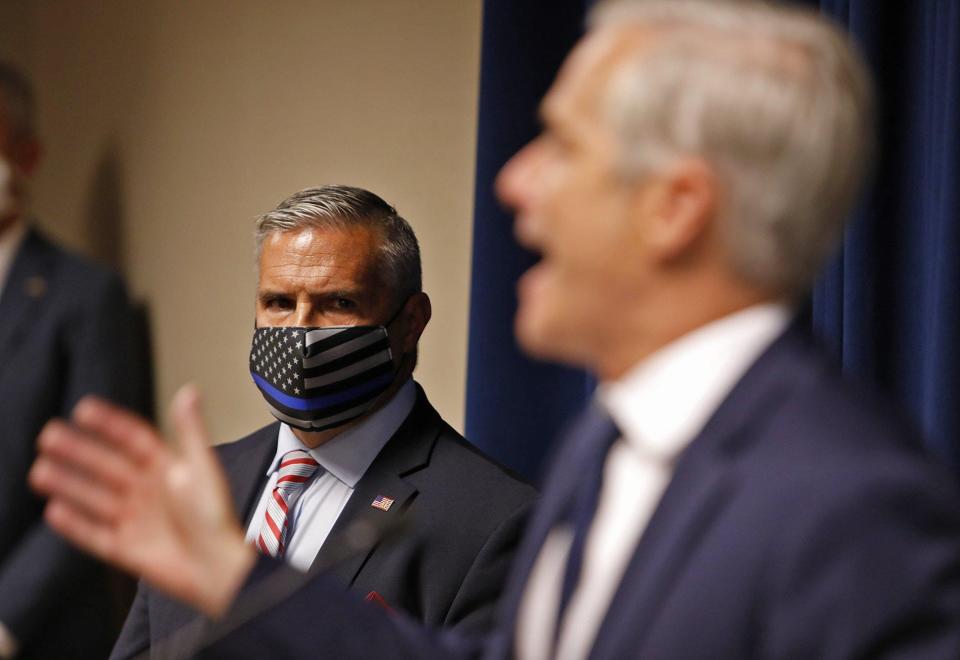
The trial begins Friday, four years after Householder was elected speaker of the Ohio House of Representatives for the second time in his career. Householder and Borges have pleaded not guilty and are vigorously defending their case, trying to exclude evidence that might make them look bad by association.
Householder and Borges’ defense: Ohioans might not like the way the political sausage gets made, but that doesn’t make their actions illegal.
Like it or not, dark money contributions are part of politics as usual, they argue.
A new brown paper bag
In this case, no one tucked cash into a brown paper bag and slipped it across the table to a corrupt politician.
Instead, federal prosecutors allege that the bribes came in the form of $61 million pumped through dark money political groups. FirstEnergy admitted it used these secretive groups because they aren’t required to disclose donors.
![FirstEnergy Corp. President and CEO Charles “Chuck” Jones appears at the company’s Akron headquarters in 2015. The FBI served subpoenas at its offices in July 2020 in connection with a state bribery investigation. Jones and FirstEnergy have denied any wrongdoing. [Phil Masturzo/Beacon Journal file photo]](https://s.yimg.com/ny/api/res/1.2/G7KD1f3pLiRG7CJm90ykzw--/YXBwaWQ9aGlnaGxhbmRlcjt3PTk2MDtoPTUzOQ--/https://media.zenfs.com/en/usa_today_news_641/fceb89ce9c0f2c9a722a1e4a30aa51ac)
The money was used to put Householder back into the speaker’s job, whip up votes for the bailout bill and then fight the referendum.
Householder needed a benefactor for his comeback. FirstEnergy executives needed a candidate who would listen. Here’s how they both got what they wanted:
After his first turn as Ohio House speaker, Householder left in 2004 because of term limits. At the time he faced a federal investigation for allegations of pay-to-play politics – a cloud that cast doubt on his political future. In 2006, federal prosecutors would announce that the investigation was closed without charges.
After delving into local politics and business ventures for several years, Householder returned to the Ohio House in 2017 and hatched a plan to return as speaker.
Winning the speaker’s post – one of the three most powerful jobs in state government – requires hard work, allies and money.
Enter FirstEnergy.
For years, FirstEnergy and its supporters had been looking for a way to help pay for the Davis-Besse and Perry nuclear plants along Lake Erie. The company wanted state or federal authorities to provide a financial handout. Competitors and consumer groups cried foul.
But FirstEnergy found a politician willing to help: Larry Householder.
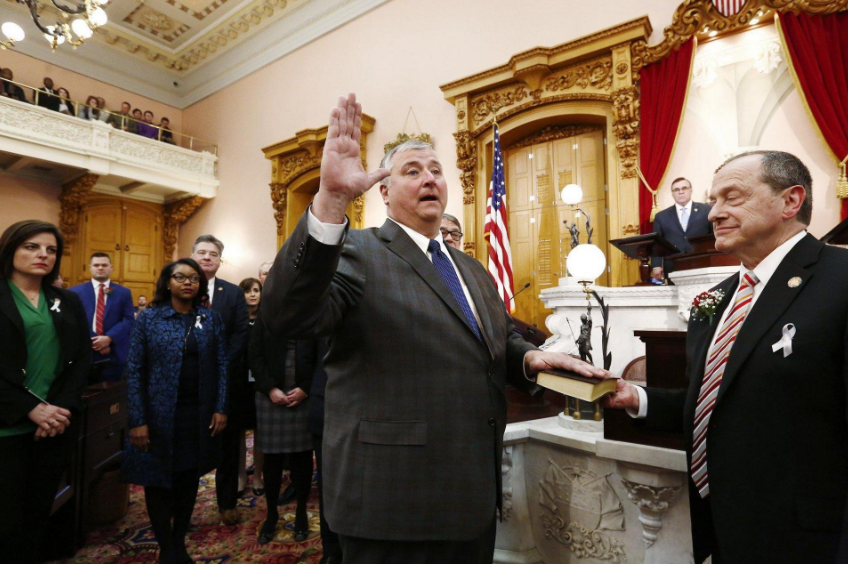
Householder and one of his sons hitched a ride on FirstEnergy’s corporate jet to Donald Trump’s inauguration in January 2017. Shortly after that, cash from FirstEnergy and its allies started flowing into Generation Now, a dark money group aligned with Householder.
Generation Now was the engine that fueled Householder’s return to power. It funneled cash for ads backing Republican candidates loyal to Householder, who later supported Householder for speaker. His team along with 26 Democrats, eager for any scrap of influence, delivered the votes needed to hand him the speaker’s gavel in January 2019.
'The more we explain it, the worse it does'
With gavel in hand, Householder set his sights on a key legislative priority: a $1 billion bailout for two nuclear plants owned by FirstEnergy Solutions. Passing House Bill 6 would take nearly $16.9 million in secretive political donations, federal investigators say, but the payoff far surpassed the cost.
That money bankrolled ads aimed at convincing lawmakers on the fence to vote "yes" on House Bill 6. But the bill was complex, including not only the nuclear energy subsidies but also money for coal plants and cuts to renewable energy benchmarks.
"Polling shows the more we explain it, the worse it does," Longstreth, Householder's strategist, told the Republican speaker in a text message. Householder replied: "Of course."
The push for House Bill 6 was on. Members of Congress, future Ohio Republican Party leader Bob Paduchik, DeWine and Lt. Gov. Jon Husted all asked lawmakers to back the bill, which was seen as essential to saving the nuclear plant jobs as Trump's reelection kicked into gear. At one point, DeWine's chief of staff authorized the state plane to pick up lawmakers whose "yes" votes were needed.
Clark, a lobbyist who acted as a Householder's proxy during the House Bill 6 negotiations, warned Republican Rep. Dave Greenspan that those who vote against Householder could lose committee chairmanships, caucus financial aid and support for their bills. But Greenspan still voted "no."
Householder sent Greenspan a text message: "I just want you to remember − when I needed you − you weren't there. twice."
House Bill 6 ultimately passed both the House and Senate with bipartisan support. But the fight was far from over.
'When the Legislature votes on something, it needs to stay law'
Even before the ink from DeWine's signature was dry on House Bill 6, opponents of the $1 billion nuclear bailout − ranging from oil and gas industry leaders to green energy advocates − were working to overturn it.
Those who disagree with the laws Ohio legislators pass can put them on the ballot for an up or down vote. The process is called a referendum and it's been around since 1912.
But getting it on the ballot requires collecting 265,774 valid voter signatures – roughly the population of Toledo – from half of Ohio’s 88 counties. And doing it within 90 days.
Householder, FirstEnergy and their allies were waging an all-out war to protect the bailout. If House Bill 6 fell, that would prove Householder's grip on Ohio politics was weak.
“It is so important that they are not successful, because when the Legislature votes on something, it needs to stay law," Householder said during a September 2019 dinner recorded by the FBI.
House Bill 6 supporters went to work:
They spent nearly $550,000 in one week to hire signature collection firms, both big and small, to stay out of Ohio.
They used public records to pry into the backgrounds of their opponents, even crafting an attack ad that signature collectors were criminals.
They texted signature collectors working in Ohio with offers of $2,500 and a paid plane ticket to leave.
They launched ominous mailers that read: "China is quietly invading our energy grid and coming for our Ohio jobs. Don’t sign their petition allowing China control over Ohio.”
Suddenly, Ohioans were paying attention to House Bill 6.
House Bill 6 backers sowed confusion by trailing signature collectors and offering voters conflicting information. At one point, they even collected signatures for a fake countermeasure. These signatures were delivered with fanfare to Ohio lawmakers, never to be seen again.
"It was kind of an ingenious idea," said Lynaugh, who led the anti-House Bill 6 referendum. "When you have those kinds of resources and you have creative people who have experience, they can come up with some pretty disruptive things."
In the thick of the referendum and counter-campaign, the FBI caught a big break.
Tyler Fehrman, a GOP consultant working with Lynaugh, met with Borges, who was working to protect House Bill 6. Borges' firm, 17 Consulting Group, received $1.62 million from Generation Now, the Householder-aligned dark money group.
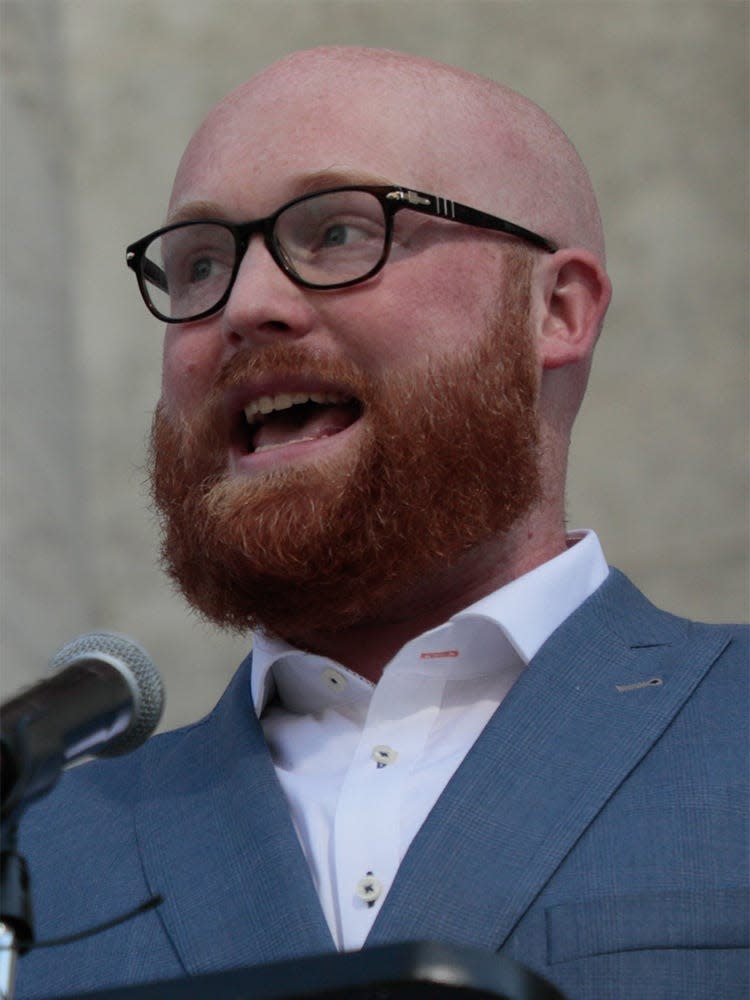
According to federal prosecutors, Borges paid $15,000 to Fehrman in exchange for details on how many signatures the referendum effort had collected. Fehrman wore an FBI wire.
Weeks before the official end of the referendum effort, Lynaugh knew they would come up short. A signature collecting firm from Michigan had left the state. Some of his workers had been assaulted, and others were tailed until they pulled into police stations.
Householder and FirstEnergy had won. House Bill 6 was now law in Ohio.
The fall of Householder
Then, everything changed. Early on July 21, 2020, FBI agents arrested Householder at his Perry County farm, a 100-acre property just outside Glenford. The once-powerful Republican legislative leader followed his attorney from the U.S. Courthouse in downtown Columbus, wearing a mask he had scorned throughout the COVID-19 pandemic.

Details emerged about how dark money paid for more than $100,000 in repairs to Householder's Florida home, $300,000 to resolve a defamation lawsuit that Householder brought against a political opponent and $20,000 in credit card debt, according to federal investigators.
In the months that followed:
Longstreth and Cespedes pleaded guilty to their roles in the bribery scheme.
FirstEnergy fired several top executives, including CEO Chuck Jones.
In March 2021, Clark died by suicide, wearing a "DeWine for Governor" t-shirt, near his Bonita Springs, Fla., home. (In court filings, federal prosecutors said they'll object if anyone brings up his suicide, arguing that it's irrelevant.)
Later that month, Ohio lawmakers repealed the nuclear bailout portion of House Bill 6.
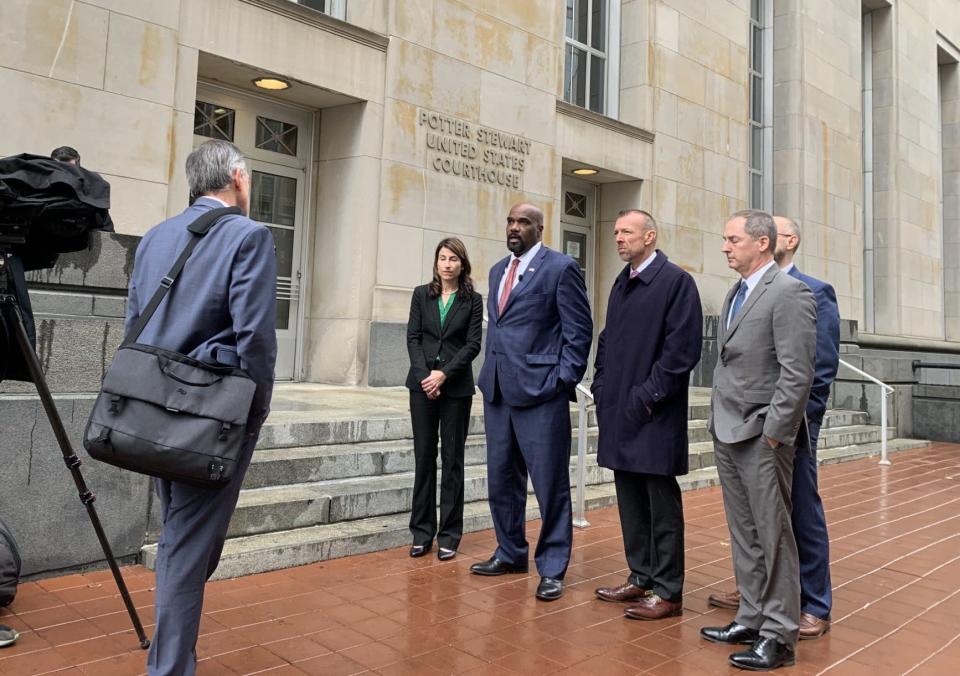
Nearly a year after Householder's arrest, his colleagues in the Ohio House of Representatives removed him from office. Amid the stunning defeat, Householder remained confident in his innocence: "They say the truth will set you free. I look forward to it."
Shortly after, FirstEnergy admitted its executives had bribed public officials, including Householder and DeWine appointee former chairman of the Public Utilities Commission of Ohio Sam Randazzo, to secure a nuclear bailout and other favorable treatment. The company entered into a deferred prosecution agreement − effectively a plea deal − and agreed to pay a $230 million penalty.
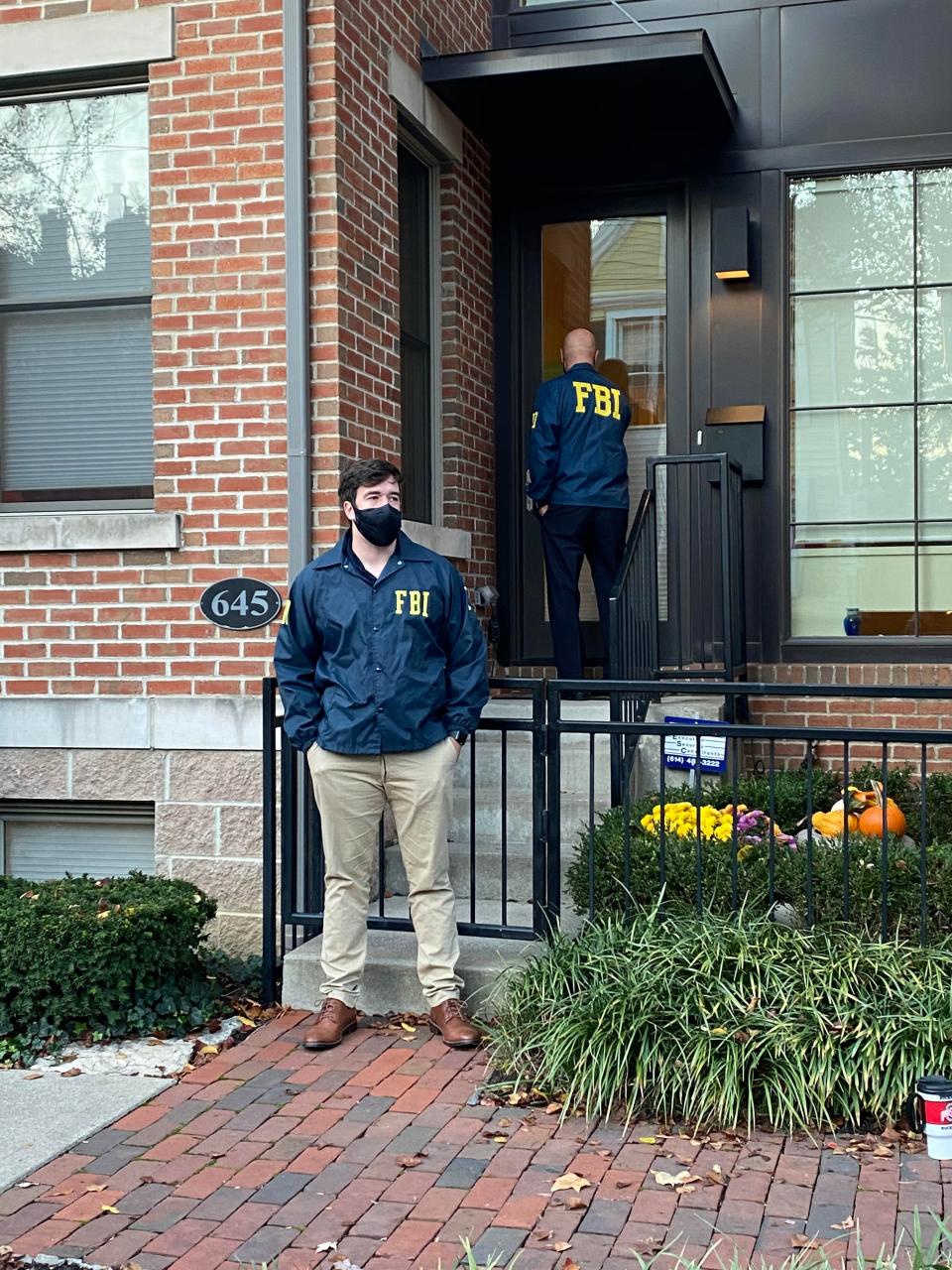
But 18 months after the initial arrests, no one from FirstEnergy or its energy allies has been charged. Randazzo, whose home was searched by the FBI in November 2020, has not been accused of a crime. The true scope of the House Bill 6 scandal remains unclear.
Federal prosecutors must now prove that Householder's and Borges' actions crossed a line beyond bare-knuckled, high-stakes politics. They must unravel the web of dark money groups to reveal a sophisticated brown paper bag.
Beyond a reasonable doubt, they must prove this wasn't politics as usual.
USA TODAY Network Ohio bureau reporters Jessie Balmert and Laura Bischoff have been following the House Bill 6 scandal since the story broke. They will continue to follow developments and the trial. Follow them on Twitter at @lbischoff and @jbalmert for updates.
The USA TODAY Network Ohio Bureau serves the Akron Beacon Journal, Cincinnati Enquirer, Columbus Dispatch and 18 other affiliated news organizations across Ohio.
Get more political analysis by listening to the Ohio Politics Explained podcast
This article originally appeared on USA TODAY: Ohio bribery scandal: Trial of ex-Speaker Larry Householder starts

